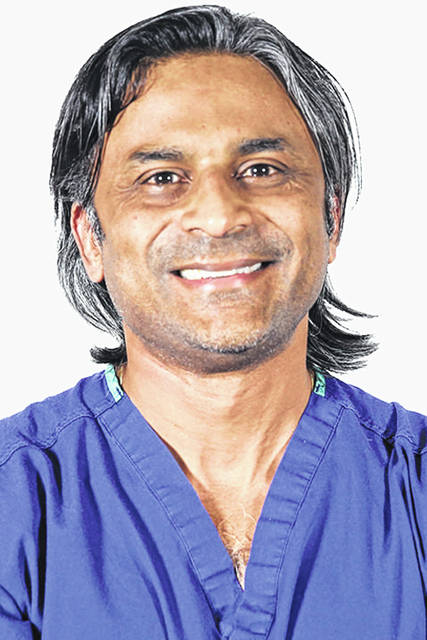
SIDNEY – Reports of heart attacks have declined by 40 percent worldwide during the COVID-19 pandemic, a trend that worries Wilson Health cardiologist Dr. Lou Vadlamani.
“It’s been very mysterious,” Vadlamani said. “There’s been a huge drop in heart attacks. They’re not elective. People who have heart attacks have heart attacks. You don’t have a choice.”
The most likely reason why reports of heart attacks have plummeted, Vadlamani said, is that people are staying home and avoiding the hospital – even when they should seek medical attention.
That realization dawned on Vadlamani during the final weekend of April. That weekend he had two individuals call him and wanted to manage their symptoms over the phone instead of coming to the hospital.
One of the patients had a high heart rate, a condition that wasn’t too bad. But the other patient, a 42-year-old man, had a massive heart attack that required two stents.
The man suffered what is known as a widowmaker heart attack, a blockage of the left anterior descending artery. Left untreated, the condition often leads to death and at a minimum would cause serious damage to the heart.
“Certainly he would have damaged a big chunk of the heart,” Vadlamani said.
Indications are people are avoiding hospitals because of COVID-19 fears, Vadlamani said. However, he warned that avoiding treatment for heart disease is much more dangerous than potentially becoming infected by the coronavirus.
“The chances that you will die of a heart attack are much higher than COVID, especially in a place like Sidney where fortunately we haven’t had many cases,” Vadlamani said.
Hospitals also have taken precautions to minimize the risk of patients becoming infected.
“Things have changed quite a bit from what the ERs used to look like,” Vadlamani said. “A lot of this fear is from the historic view that we have of ERs, crowded and people coughing and sneezing. That’s not true anymore.”
Wilson Health has followed all the recommendations of the Centers for Disease Control and Prevention and National Institutes of Health to reduce the chances of spreading COVID-19. Everyone wears masks, workers are screened for COVID-19 symptoms, visitors aren’t allowed in the hospital and intensive care units where COVID-19 patients are treated have negative ventilation systems that prevent the spread of germs.
“The chances of you getting COVID at the grocery store are probably higher than at the hospital,” Vadlamani said.
People with ailments such as colds and the flu have been advised to call before visiting a doctor or hospital, but when it comes to heart issues, people need to act quickly.
Anyone who has symptoms of a heart attack immediately should call 911 and get to an emergency room.
“Don’t ignore symptoms that you feel are your heart because time is of the essence,” Vadlamani said.
Heart attacks can be fatal, but even non-fatal ones can cause lasting damage. Vadlamani likened them to a plant that isn’t watered and slowly withers away.
“If you ignore it, there are significant consequences,” he said, “if not immediate, then long term.”
Before a heart attack occurs, prevention is important. People with history of heart disease need to keep their doctor’s appointments and take their medications, ensuring they have refills before running out of medication.
Lifestyle modification is important to prevent developing heart disease.
People should avoid eating fatty foods with high cholesterol and smoking. They also need to exercise and make sure their blood pressure is under control.
And now that it’s getting nicer outside, Vadlamani said, it’s a good time to go for a walk.
As time goes by and the COVID-19 pandemic passes, doctors will get a clearer view of what has happened worldwide with heart disease, Vadlamani said. But what’s already clear is that people need to take their heart health seriously.
“If you feel you’re having symptoms, you feel it’s your heart, come in,” Vadlamani said. “Let’s not gamble with essentially your life.”
For more information, visit www.wilsonhealth.org or call 937-494-5988.


